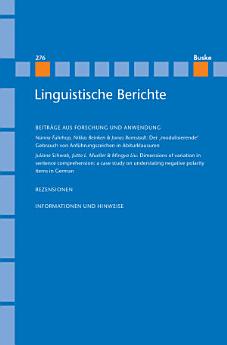Linguistische Berichte Heft 276
Markus Steinbach · Nina-Kristin Meister · Günther Grewendorf · Arnim von Stechow
2023年12月 · Helmut Buske Verlag
電子書
121
頁數
family_home
符合資格
info
report評分和評論未經驗證 瞭解詳情
關於這本電子書
Beiträge aus Forschung und Anwendung – Nanna Fuhrhop, Niklas Reinken & Jonas Romstadt: Der 'modalisierende' Gebrauch von Anführungszeichen in Abiturklausuren Abstract: Quotation marks are substantially used for direct speech and citations. For the 'modalizing' use, the Official Rules state that a "different understanding than usual" is indicated; they give very little information on the use of quotation marks beyond literal reference. It therefore seems all the more interesting to investigate the usage of modalizing quotation marks. In the present analysis, we studied the school-leaving examinations of an entire year. School-leaving examinations are texts by persons whose institutional acquisition of written language can be regarded as complete; they are texts written by skilled writers. The investigation takes into account both formal and functional observations. We recognized differences between school subjects that can be interpreted with regard to the concept of educational language. The writers described here showed a high sensitivity (conscious or unconscious) to the use of quotation marks, which we call the "struggle for educational language". This may be related to the corpus investigated here. However, our study constitutes a solid basis for further corpus studies on quotation marks. – Juliane Schwab, Jutta L. Mueller & Mingya Liu: Dimensions of variation in sentence comprehension: a case study on understating negative polarity items in German Abstract: Despite the rich theoretical and empirical literature on negative polarity items (NPIs) in general, understating NPIs like all that or much have received relatively little attention in psycholinguistics. In this paper, we investigate the comprehension, processing, and production of two such understating NPIs in German, namely 'sonderlich' ('particularly') and 'so recht' ('really'). In a first experiment, using self-paced reading and naturalness ratings, we found that 'sonderlich', contrary to 'so recht', was rated as natural in affirmative contexts although this environment is incompatible with NPIs. The finding is subsequently extended to the domain of sentence production, demonstrating that 'so recht' was consistently used as NPI, but 'sonderlich' was not. The last two experiments investigate the factors underlying this finding, showing that the surprising patterns for 'sonderlich' may relate to its susceptibility for interference from form- and meaning-related lexical competitors during tasks that strain cognitive resources, and, to some extent, to individual differences in participants' language aptitude measured through print exposure. Based on the novel empirical data, we discuss the theoretical status of 'sonderlich' and 'so recht' as understating NPIs, on the one hand, and the cognitive mechanisms affecting retrieval of their NPI-related lexical-semantic features, on the other. Rezensionen – Sophie Ellsäßer: Magali Paquot & Stefan Th. Gries (Hgg.) (2020): A practical handbook of corpus linguistics – Okan Kubus: Gary Morgan (ed.) (2020): Understanding deafness, language and development – Horst M. Müller: Michael A. Arbib (Hg.) (2020): How the brain got language – towards a new road map Informationen und Hinweise von Klaus Müllner und den Herausgeber*innen
關於作者
Nina-Kristin Meister (geborene Pendzich) hat an der Georg-August-Universität Göttingen Deutsche Philologie und Geschichte studiert und in Germanistischer Linguistik zum Thema »Lexikalische nichtmanuelle Markierungen in der Deutschen Gebärdensprache (DGS)« promoviert. Seit 2017 ist sie Leiterin des Experimentellen Gebärdensprachlabors am Seminar für Deutsche Philologie der Georg-August-Universität Göttingen und unterrichtet Germanistische Linguistik mit Schwerpunkt in der DGS. Ebenfalls seit 2017 ist sie in der Redaktion der Fachzeitschrift »Linguistische Berichte« tätig.
為這本電子書評分
請分享你的寶貴意見。
閱讀資訊
智能手機和平板電腦
手提電腦和電腦
你可以使用電腦的網絡瀏覽器聆聽在 Google Play 上購買的有聲書。
電子書閱讀器及其他裝置
如要在 Kobo 等電子墨水裝置上閱覽書籍,你需要下載檔案並傳輸到你的裝置。請按照說明中心的詳細指示,將檔案傳輸到支援的電子書閱讀器。







